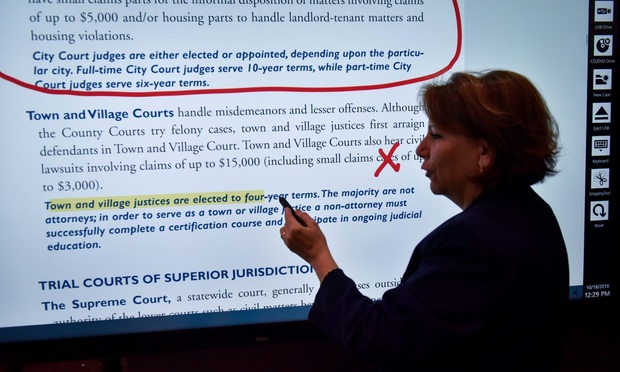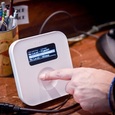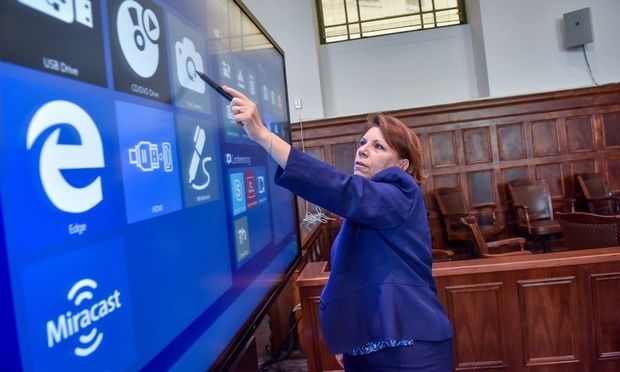In an Effort to Be the Premier Court in the World, NY Is Investing in the Commercial Division
"We are committed to taking the fullest advantage of technology to help us adjudicate the challenging disputes that 21st-century litigation can present," said Chief Administrative Judge Lawrence K. Marks.
October 22, 2018 at 02:21 PM
4 minute read
 Justice Saliann Scarpulla in her technology-enabled courtroom at 60 Centre Street. The goal is to provide an almost paperless courtroom. (Photo: David Handschuh/NYLJ)
Justice Saliann Scarpulla in her technology-enabled courtroom at 60 Centre Street. The goal is to provide an almost paperless courtroom. (Photo: David Handschuh/NYLJ)
New York courts want to be the go-to venue for settling international disputes, and officials are investing in whizbang technology that has the potential to transform commercial trials.
The technology debuted in state Supreme Court Justice Saliann Scarpulla's courtroom, Room 208 at 60 Centre St., this month. Scarpulla, who is tech-savvy, is helping the Office of Court Administration work out the kinks before other courtrooms are upgraded.
“We are committed to taking the fullest advantage of technology to help us adjudicate the challenging disputes that 21st-century litigation can present,” said Chief Administrative Judge Lawrence K. Marks. “This is particularly true for complex commercial litigation. But it is also true for other categories of cases, including Family Court matters as well as a range of other types of litigation, civil and criminal.”
 Photo: David
Photo: DavidHandschuh
Bringing the most up-to-date technology to a courthouse built in 1927 and whose facade is synonymous with the widely popular TV series “Law and Order” presented challenges. The building, which is owned by New York City, is protected by landmark status and the court system is required to preserve its intricate woodwork, beautiful artwork and historic elements.
“It needs to reflect both the rich and deep history of the law in New York state but also reflect the current philosophy of making litigation more user-friendly, less expensive and more efficient,” Scarpulla said.
At a cost of $40,000, the courtroom was outfitted with an 86-inch screen to display documents, a podium with a document viewer and a USB port and smaller screens for the attorneys and the judge. The jury box was expanded to make room for a wheelchair, and jurors with difficulty hearing or seeing are able to serve with technological assistance.
“Touching the screen or using a stylus on the screen, the 86-inch screen is set so that the attorneys can highlight info on the screen, mark up documents and save them as marked-up documents or let the markup go,” Scarpulla said. “We have laptops that the attorneys provide and we bring up the flash drive to the jury so they're not inundated with giant boxloads of documents. So we can promise a juror that they're not going to be here for six months looking through documents.”
The attorneys have the option of connecting their personal laptops so they don't need notes and there is software that hooks into the large screen so that an attorney can attend a conference by Skype. An attorney at the podium can scan any document not on the flash drive at the last minute. There is a separate USB port if the attorneys feel their documents are too confidential for the court's Wi-Fi.
“It's much cheaper and smarter to bring a flash drive into court than to hire three or four people to bring in 30 or 40 boxes of documents, which has happened in my courtroom,” she said. “Three people were needed to bring the documents in and one or two people to go through them and pull out documents as needed during the trial.”
Recently, Scarpulla spoke to about 80 commercial judges from the around the world at an international forum in the Southern District of New York. She said none had the amenities available in courtroom 208.
“We think it's important to have the right technology to give the business community in New York the sense that we could compete with the best courts in the world,” she said.
 Justice Scarpulla. (Photo by David Handschuh/NYLJ)
Justice Scarpulla. (Photo by David Handschuh/NYLJ)This content has been archived. It is available through our partners, LexisNexis® and Bloomberg Law.
To view this content, please continue to their sites.
Not a Lexis Subscriber?
Subscribe Now
Not a Bloomberg Law Subscriber?
Subscribe Now
NOT FOR REPRINT
© 2025 ALM Global, LLC, All Rights Reserved. Request academic re-use from www.copyright.com. All other uses, submit a request to [email protected]. For more information visit Asset & Logo Licensing.
You Might Like
View All


Law Firms Expand Scope of Immigration Expertise Amid Blitz of Trump Orders
6 minute readTrending Stories
- 1Which Legal Tech Jobs Are on the Rise, and Which Aren't, with Jared Coseglia
- 2Absent Explicit Agreement, Court Rejects Unilateral Responsiveness Redaction of Text Messages
- 3SEC Whistleblower Program: What to Expect Under the Trump Administration
- 4Sidley Hires Paul Hastings Energy Finance Partner in Houston
- 5Potential Pitfalls in Arbitrating Religious Disputes
Who Got The Work
J. Brugh Lower of Gibbons has entered an appearance for industrial equipment supplier Devco Corporation in a pending trademark infringement lawsuit. The suit, accusing the defendant of selling knock-off Graco products, was filed Dec. 18 in New Jersey District Court by Rivkin Radler on behalf of Graco Inc. and Graco Minnesota. The case, assigned to U.S. District Judge Zahid N. Quraishi, is 3:24-cv-11294, Graco Inc. et al v. Devco Corporation.
Who Got The Work
Rebecca Maller-Stein and Kent A. Yalowitz of Arnold & Porter Kaye Scholer have entered their appearances for Hanaco Venture Capital and its executives, Lior Prosor and David Frankel, in a pending securities lawsuit. The action, filed on Dec. 24 in New York Southern District Court by Zell, Aron & Co. on behalf of Goldeneye Advisors, accuses the defendants of negligently and fraudulently managing the plaintiff's $1 million investment. The case, assigned to U.S. District Judge Vernon S. Broderick, is 1:24-cv-09918, Goldeneye Advisors, LLC v. Hanaco Venture Capital, Ltd. et al.
Who Got The Work
Attorneys from A&O Shearman has stepped in as defense counsel for Toronto-Dominion Bank and other defendants in a pending securities class action. The suit, filed Dec. 11 in New York Southern District Court by Bleichmar Fonti & Auld, accuses the defendants of concealing the bank's 'pervasive' deficiencies in regards to its compliance with the Bank Secrecy Act and the quality of its anti-money laundering controls. The case, assigned to U.S. District Judge Arun Subramanian, is 1:24-cv-09445, Gonzalez v. The Toronto-Dominion Bank et al.
Who Got The Work
Crown Castle International, a Pennsylvania company providing shared communications infrastructure, has turned to Luke D. Wolf of Gordon Rees Scully Mansukhani to fend off a pending breach-of-contract lawsuit. The court action, filed Nov. 25 in Michigan Eastern District Court by Hooper Hathaway PC on behalf of The Town Residences LLC, accuses Crown Castle of failing to transfer approximately $30,000 in utility payments from T-Mobile in breach of a roof-top lease and assignment agreement. The case, assigned to U.S. District Judge Susan K. Declercq, is 2:24-cv-13131, The Town Residences LLC v. T-Mobile US, Inc. et al.
Who Got The Work
Wilfred P. Coronato and Daniel M. Schwartz of McCarter & English have stepped in as defense counsel to Electrolux Home Products Inc. in a pending product liability lawsuit. The court action, filed Nov. 26 in New York Eastern District Court by Poulos Lopiccolo PC and Nagel Rice LLP on behalf of David Stern, alleges that the defendant's refrigerators’ drawers and shelving repeatedly break and fall apart within months after purchase. The case, assigned to U.S. District Judge Joan M. Azrack, is 2:24-cv-08204, Stern v. Electrolux Home Products, Inc.
Featured Firms
Law Offices of Gary Martin Hays & Associates, P.C.
(470) 294-1674
Law Offices of Mark E. Salomone
(857) 444-6468
Smith & Hassler
(713) 739-1250







